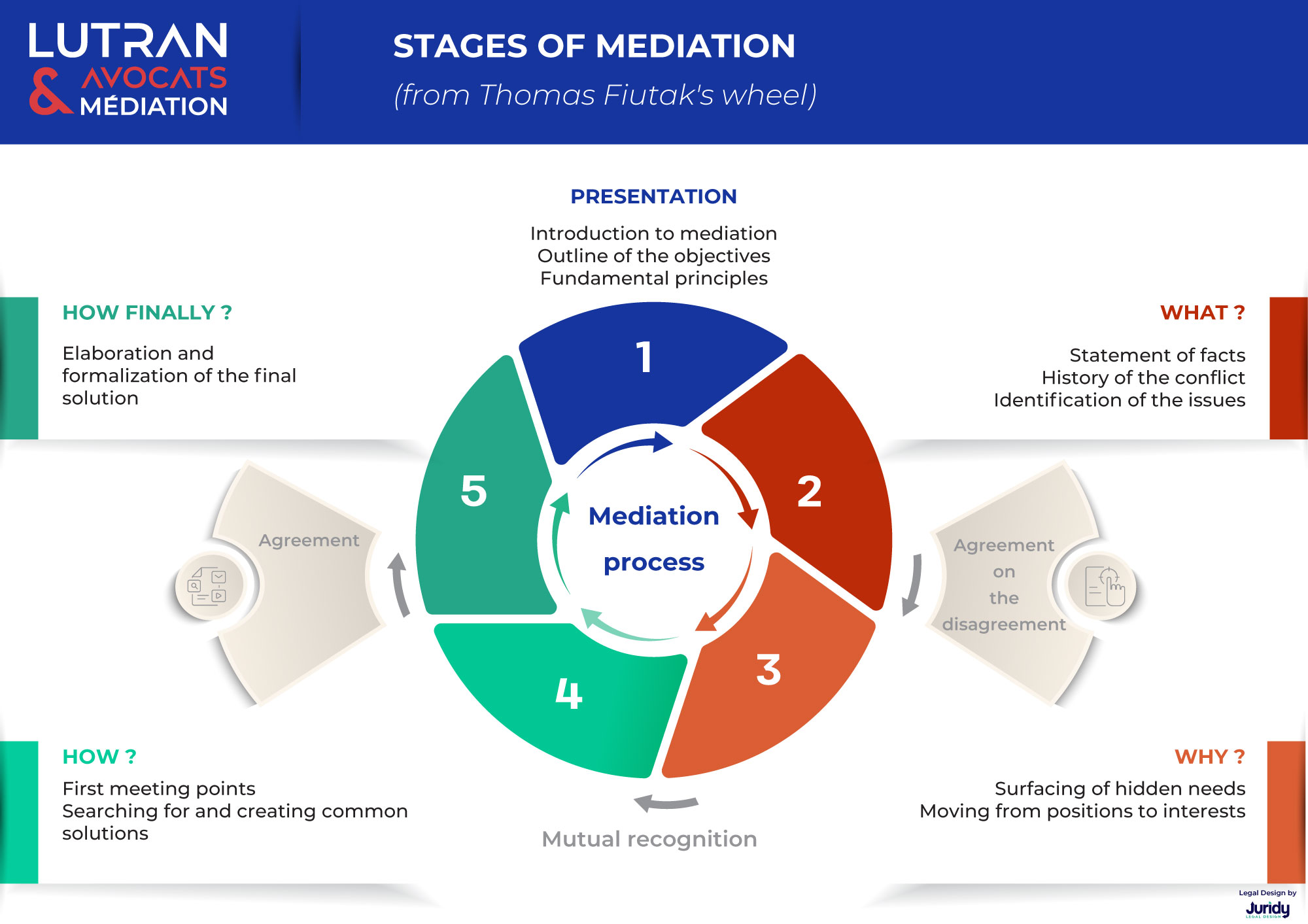Mediation and amicable resolution of disputes
Lutran Avocats & Médiation team integrates amicable dispute resolution methods
to help its clients resolve their difficulties
Definition of mediation :
Mediation is defined as a confidential process taking place outside of a trial (judicial or arbitral) or parallelly tending to the resolution of a dispute between the parties, with the help of a neutral third party, independent and impartial called mediator.
The role of the mediator – whose only power is to be able to put an end to the mediation and who has no means of constraining the parties (unlike the judge who supervises the hearing) – is to facilitate the establishment and / or the pursuit of a dialogue between the parties and to support them in their amicable process.
Mediation allows to precisely determine the object of the conflict as well as its deep origin with a view of establishing a lasting solution between the parties, which the mediator cannot replace – the parties remaining the sole decision-makers for the establishment and implementation of their agreement.


Our mediation Pratice
The team at Lutran Avocats & Médiation includes a mediator (also a lawyer), David LUTRAN – mediator accredited from the Paris Mediation and Arbitration Center (CMAP) – and a lawyer, Célina GUICHENDUC, who is currently undergoing training to become a mediator after having been trained to assist clients in mediation. The firm’s lawyers are also perfectly familiar with other amicable dispute resolution methods, such as collaborative law, participatory procedure and interest-based negotiation.
The context of the development of amicable dispute resolution methods (ADR)
Various critics are voiced to denounce the functioning of justice in France, such as complexity, length of the proceedings, significant costs as well as the trial’s inherent contingencies.
In addition, the concerns of litigants have evolved as they express new expectations regarding the resolution of their dispute and the means to respond to it in order to find a solution adapted to their needs – beyond the sole financial compensation, in most cases.
These alternative modes, which consecutive French governments have made a priority in order to lower the pressure over the courts, are set to develop significantly due in particular to the health crisis linked to COVID-19.

A confidential process taking place outside or parallel to a trial aimed at resolving a dispute between parties, with the help of a neutral, independent and impartial third party named mediator. The role of the mediator is to facilitate the establishment and continuation of a dialogue between the parties and to accompany them in their amicable approach
A process in which the parties and their lawyers, properly trained, attempt, before any referral to the judge, to find a negotiated solution. The actors of the collaborative process undertake, through a collaborative charter, to respect its cardinal principles (confidentiality, courtesy, respect for others and transparency in the communication of useful information to understanding the conflict and its resolution)
Process involving the appointment of a conciliator, whose mission is to try to make the parties agree. The conciliator is free to use the methods of his choice for this purpose. In particular, he may intervene in the discussion between the parties or guide it, declare himself in favour of a solution, or even implement mediation techniques if he masters them.
A method by which the parties can reach a fair solution in negotiations that privilege listening to the other party and fair behaviour. Interest-Based Negotiation focuses on the interests – common and opposite – of the parties rather than on their respective declared positions, in order to get out of a blocked situation and to favour the continuation of their relations
Procedure put in place by a fixed-term agreement signed by the parties who undertake to “work jointly and in good faith to settle their dispute amicably” with the mandatory assistance of their lawyers. This agreement suspends the applicable statute of limitations, prohibits the parties from bringing the matter before the judge and establishes a confidential framework in which the parties can submit their arguments
Mediation is efficient for two reasons :
- At the quantitative level, being a fast solution, at a low cost, the final agreement is generally carried out spontaneously by the parties, unlike the necessarily long (several years…) and expensive legal procedure, which involves a hazard with regard to the judge’s decision and also often gives rise to enforcement difficulties
- At the qualitative level, the mediated agreement allows the parties to develop a tailor-made solution meeting their needs and resolving their conflict in its various aspects (legal, economic, reputational, etc.) The solution found can go beyond the difficulties voiced at the beginning of the case, which often arises
Almost the entire legal spectrum is concerned with mediation. It is therefore possible to resort to it for a large number of disputes (commercial, social, family, real estate, partner disputes, etc.)
Mediation is a voluntary, consensual and flexible process. The parties who decide to initiate a mediation do so in a free and informed manner and have the possibility, at any time, to exit the mediation process without explaining their reasons. The parties who decide to go through mediation therefore do not waive their right to resort to a judge in case mediation fails.
The parties may decide to enter into mediation at any time, when a conflict is about to arise or has already arisen, whether or not the conflict has been referred to a judge.
Parties to a mediation can be physical or legal persons, private or public.
To suggest mediation to its client, the lawyer can detail the strengths and weaknesses of its case (not only from a legal standpoint: economic aspects, reputation, confidentiality …), but also the advantage of resorting to mediation in comparison to proceedings before state courts, in terms of time, cost and sizing of the solution.
The lawyer can also draw the client’s attention to the possibility of restoring relations with the other party during the mediation process, the voluntary nature of which facilitates the enforcement of the agreement, being a contract freely concluded and wanted by the parties.
The mediator can be reached directly by the parties or through their lawyer when the said parties decide to initiate a mediation process.
The mediator can also be appointed by a court in the event of judicial mediation when the parties have informed the judge of their agreement to attempt mediation.
The mediator collects the willingness of the parties to enter into mediation and drafts a mediation contract, which specifies the conditions of intervention of the mediator as well as the conduct of the mediation process.
Mediation is a structured process, which allows the parties to identify their disagreement and understand its reasons to allow restoration of the dialogue in view of reaching a suitable solution encompassing all aspects of the dispute.
This process usually takes place over five stages, illustrated by the wheel of the famous mediator Thomas Fiutak :

Usually, the mediator exchanges with the parties’ counsels ahead of these meetings in order to discuss the case and prepare plenary meetings to identify possible solutions and streamline discussions between the parties.
The lawyer who accompanies his client in mediation fully exercises his advisory role, assisting his client both on the legal aspects and on the opportunity of resorting to mediation, during the mediation process as well as in the elaboration and structuring of the mediation agreement.
The ethics of the lawyer constitute a guarantee for the security of the process and its fluidity: professional secrecy, confidentiality, independence, loyalty, fraternity.
Mediation lasts on average between 15 to 20 hours, depending on the complexity of the case (on a technical and interpersonal levels), the number of parties, the domestic or international dimension of the conflict.
The mediator freely sets the amount of his fees which are generally divided equally between the parties to the mediation and depend notably on the complexity of the case, the number of parties and the international dimension of the conflict.
Insofar as the fees are equally divided between the parties, the latter have a real interest in investing in a mediation process which is particularly advantageous when it comes to ending a conflict rapidly and efficiently a reasonable cost.
Mediation is in principle confidential. Therefore, all the elements and information exchanged in this context cannot be communicated to third parties or used in the context of any legal proceedings.
Confidentiality is fundamental because it allows the parties to express themselves freely and without risk in the context of mediation.
However, the parties remain free to waive the confidentiality of the information exchanged during it, subject to their mutual agreement.
The mediator’s ethics are based on the following triptych, fundamental to establish a climate of trust and mutual respect between the parties during the mediation :
- Independence: the independence of the mediator implies that he is in a dependency status with the parties and / or their counsel
- Impartiality: the impartiality of the mediator implies that he must not favor any party over another, not concede to any influence from any source whatsoever and not put himself in a situation of conflict of interest
- Neutrality: the neutrality of the mediator requires him not to prejudge, and to have no assumption or interest in the outcome of the dispute
Unlike the judge, the mediator has no power of constraint vis-à-vis the parties. His only power is to put an end to the mediation if he considers, for example, that it will not succeed or that the mediation is misused by one of the parties
The parties have the possibility, by mutual agreement, to involve third parties in the mediation when it is in their interest. For example, to bring clarification on a particular matter (legal, technical…). They can be witnesses, technical experts, and other types of professionals
Mediation ends when the mediator and / or the parties decide to end it or when the parties have reached an agreement or find they are unable to reach such agreement.
If an agreement has been reached, it can take the form desired by the parties and cover the most diverse aspects of the conflict (legal, economic, reputational, etc.), including those which would not have been envisaged at the beginning of the mediation. The only limit in the drafting of the agreement is not breaching public policy.
The parties may choose to formalize the agreement within the framework of the provisions of articles 2044 (and seq.) of the French Civil Code governing the settlement agreement.
They also have the possibility of requesting the approval of their agreement by the judge so that it acquires the same binding force as a judgment.
Some examples of mediation cases handled by David Lutran
- Mediator in a dispute over non-payment of invoices for services rendered and non-performance of a distribution contract between a leading oil and gas company and a service provider in a Middle Eastern country in which it operates.
- Mediator in a dispute within a company (between co-managing partners and between one of the co-managing partners and the employees) specialised in the luxury dyeing of textile articles.
- Mediator in a dispute within a company (between employees and with management) in charge of managing an estate (castle and outbuildings).
- Mediator in a dispute about the termination of several leases management and the assessment of compensation due in the context of the health crisis between a leading French fast food company and several of its tenant managers and franchisees.
- Mediator in a dispute between siblings regarding the transfer of a very valuable wine estate and the distribution of the proceeds of its operation in the context of the inheritance.
- Mediator in a dispute about a breach of contract (contract for the construction work) between the energy branch of a French construction group and one of its clients.
- Mediator in a dispute between siblings regarding the transfer of a fleet of clinics and the distribution of the proceeds of its operation in the context of the inheritance.
- Mediator in a dispute between the founding partners of a company specialized in fundraising from the general public (corporate governance, human resources management, communication and market positioning)
- Mediator in a conflict between a French ready-to-wear company and one of its subcontractors located in the Maghreb in the context of the sudden termination of commercial relations at the initiative of the French company
- Mediator in a dispute between a leading French sports club, its former supplier for merchandising (clothing and various Club branded items) and the company that succeeded it, in the context of a sudden termination of commercial relations
- Mediator in a conflict between a leading French company in the food industry and one of its former staff training providers following the sudden termination of commercial relations at the initiative of the French company
- Mediator in a dispute between a foreign company providing IT services and the manager of one of the subsidiaries regarding the implementation of an earn-out clause
- Mediator in the context of an inheritance dispute between the beneficiaries of an inheritance
- Various mediations relating to the renegotiation of commercial leases and rents in the context of the Covid-19 crisis
